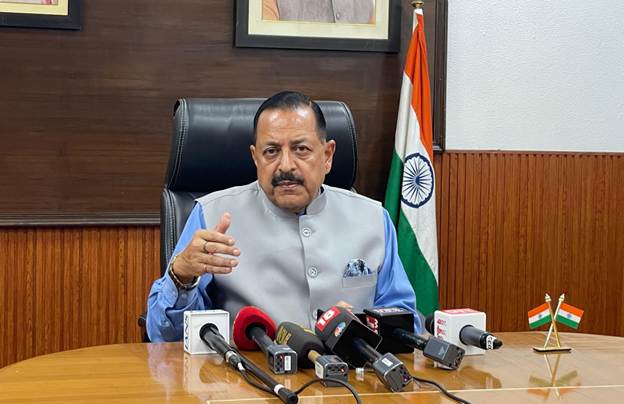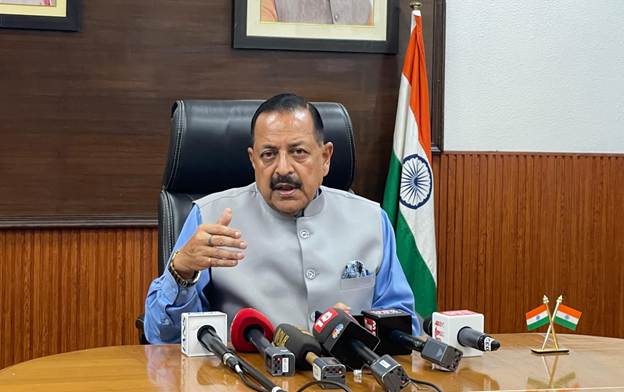Department of Space
Living up to the spirit of 'Atmanirbhar Bharat' and 'Vishwabandhu Bharat' as envisaged by Prime Minister Narendra Modi, Dr. Jitendra Singh stated that all the experiments to be carried out by Shubhanshu Shukla have been indigenously developed by Indian institutes, and the results obtained from these experiments will be shared with the rest of the world
Dr. Jitendra Singh Hails Successful Docking of Dragon Spacecraft Carrying Indian Astronaut to ISS
Seven ‘Made-in-India’ Experiments a Giant Leap in Space Sustainability: MoS Space Dr. Singh
Posted On:
26 JUN 2025 7:15PM by PIB Delhi
In a proud and historic moment for the nation, Union Minister of State (Independent Charge) for Science & Technology, Dr. Jitendra Singh, today lauded the successful docking of the Dragon spacecraft with the International Space Station (ISS), carrying aboard Indian astronaut Group Captain Shubhanshu Shukla along with three other crew members.
Living up to the spirit of "Atmanirbhar Bharat" and "Vishwabandhu Bharat" envisaged by Prime Minister Narendra Modi, Dr Jitendra Singh said, all the experiments to be carried out by Shubhanshu Shukla have been indigenously developed by Indian institutes and the results obtained from these experiments will be shared with the rest of the world.Dr. Jitendra Singh, Union Minister of State (Independent Charge) for Science & Technology, Earth Sciences, and MoS in the Prime Minister Office, Dept. of Space and Atomic Energy who has been closely monitoring the developments of the Axiom-4 mission, stated, “India’s role in space exploration is no longer limited to the launchpad. We are now shaping the future of life and science in space.” He added that Group Captain Shubhanshu Shukla carries India’s scientific dreams to the frontiers of microgravity.
Highlighting India's robust scientific contribution, Dr. Jitendra Singh announced that seven fully indigenous microgravity experiments, designed and developed entirely in India, are set to be conducted by Group Captain Shubhanshu Shukla aboard the ISS.
"These space-borne experiments are a living embodiment of Prime Minister Narendra Modi’s vision of Aatmanirbhar Bharat and Vishwabandhu Bharat. The knowledge gained will benefit not just India but serve as a gift to the global scientific community and humanity," Dr. Jitendra Singh affirmed.

Dr. Jitendra Singh noted that the first experiment involves the study of edible microalgae, led by ICGEB and BRIC-NIPGR New Delhi. This project focuses on observing the growth and metabolism of three selected varieties of edible microalgae in microgravity. The outcomes of this study hold significant potential for enhancing crew nutrition, enabling wastewater recycling, and supporting carbon dioxide to oxygen conversion, all of which are critical for long-term space habitation.
The second experiment, conducted by UAS Dharwad and IIT Dharwad, investigates the germination and nutritional properties of sprouting seeds, specifically moong and methi, under space conditions. The findings are expected to contribute to the development of nutritious food supplements for astronauts and explore the medicinal benefits of these sprouts in a microgravity environment.
The third experiment, developed by BRIC-InStem, Bengaluru, addresses the critical issue of muscle loss in space. By mimicking muscle regeneration in microgravity, the study aims to understand the biological mechanisms behind muscle degradation and identify potential interventions for astronaut health. These insights could also lead to new rehabilitation therapies for muscle-related disorders on Earth.

In the fourth experiment, researchers from IISc Bengaluru will examine the survival, revival, and reproduction of tardigrades, famously resilient microscopic organisms, under space conditions. This study is poised to offer valuable data on human adaptability and survival strategies in extreme environments, both in space and potentially on Earth.
The fifth experiment, also by IISc Bengaluru, focuses on the interaction between humans and electronic displays in microgravity. The goal is to understand how astronauts perceive and interact with digital interfaces in space, which will inform the design of safer and more efficient spacecraft control systems and crew consoles.
In the sixth experiment, ICGEB, New Delhi, explores the growth of cyanobacteria using urea as a nitrogen source in microgravity. The findings could support the development of sustainable systems for carbon and nitrogen recycling in space and highlight cyanobacteria’s potential as a superfood for long-duration missions.
Finally, the seventh experiment involves seed resilience trials, testing rice, cowpea, sesame, brinjal, and tomato seeds that have been exposed to microgravity. The objective is to assess the impact of space conditions on these seeds, with the goal of advancing space agriculture and developing climate-resilient plant varieties suitable for cultivation on Earth and beyond.
Dr. Jitendra Singh emphasized that these pioneering efforts represent India’s emergence as a global leader in space biosciences, echoing the country’s evolving role from spacefaring nation to space science innovator.
“India is no longer a follower; we are leading missions of planetary relevance. These experiments will open new frontiers for sustainable life in space and resilient ecosystems on Earth,” he said.
*****
NKR/PSM
(Release ID: 2139954)
Visitor Counter : 259